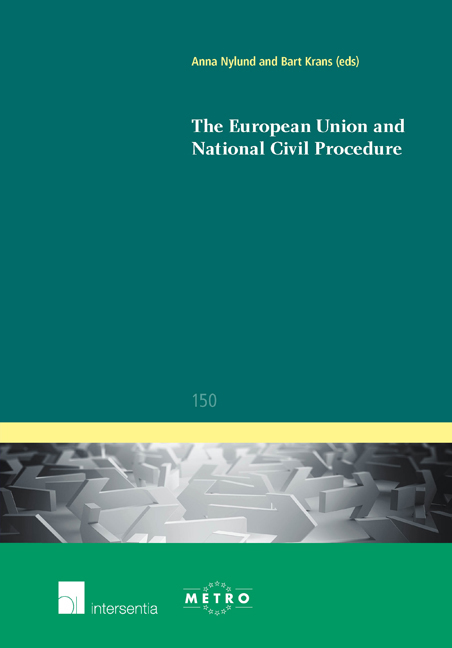Book contents
- Frontmatter
- Contents
- About the Authors
- List of Abbreviations
- The European Union and National Civil Procedure – A Rocky Road or a Smooth Process?
- Some European Challenges for Belgian Civil Procedure
- Danish Civil Procedure and the Internal Market: Impact and Challenges of Sectoral Harmonisation
- European Influences upon English Civil Justice: Tempests or Gentle Breezes?
- European Union and National Civil Procedure: The French Paradox
- The European Union and Civil Procedure from a German Perspective
- Interaction between European Law and Hungarian Civil Procedure Law
- The Impact of EU Law on Dutch Civil Procedure Law
- Norway: An Insider Outside – or an Outsider Inside – European Civil Justice
- Polish Civil Proceedings: How Much Europeanised?
- Slovenian Civil Procedure and the Transformative Power of the EU
- The Curious Incident of the Dog in the Night-Time: Europeanisation of Civil Procedure in Sweden
- Conclusions and Outlook
- Index
- Miscellaneous Endmatter
The Impact of EU Law on Dutch Civil Procedure Law
Published online by Cambridge University Press: 19 December 2017
- Frontmatter
- Contents
- About the Authors
- List of Abbreviations
- The European Union and National Civil Procedure – A Rocky Road or a Smooth Process?
- Some European Challenges for Belgian Civil Procedure
- Danish Civil Procedure and the Internal Market: Impact and Challenges of Sectoral Harmonisation
- European Influences upon English Civil Justice: Tempests or Gentle Breezes?
- European Union and National Civil Procedure: The French Paradox
- The European Union and Civil Procedure from a German Perspective
- Interaction between European Law and Hungarian Civil Procedure Law
- The Impact of EU Law on Dutch Civil Procedure Law
- Norway: An Insider Outside – or an Outsider Inside – European Civil Justice
- Polish Civil Proceedings: How Much Europeanised?
- Slovenian Civil Procedure and the Transformative Power of the EU
- The Curious Incident of the Dog in the Night-Time: Europeanisation of Civil Procedure in Sweden
- Conclusions and Outlook
- Index
- Miscellaneous Endmatter
Summary
A Growing Interplay
The growing volume of EU law has gradually revealed an intriguing interplay between EU law and national private law. This is also demonstrated by the growing role played by EU law in Dutch private law case law. As a result, the relationship between EU law and national private law has started to draw the attention of Dutch legal scholars.
Aware of the growing importance of EU law to national law in general, the Dutch Ministry of Justice began a project to improve knowledge of European law within the Dutch judiciary. It aimed to improve the accessibility of information sources on European law by using web technology, by improving knowledge of European law in the Dutch judiciary and by setting up and maintaining a network of European law court coordinators. The Hague Institute for the Internationalisation of Law initiated research into the role of national judges as European Union judges. The central aim of that research was to identify how EU law is applied by national courts in the Member States by questioning national judges on their views with regards to the application of EU law. One of its main conclusions was that Dutch (and German) judges want more information on EU law if it enables them better to recognise possible EU law issues and better to understand how to deal with those issues in the cases they decide.
The growing volume of EU law is not only important for national private law in general, but has also started to be of increasing significance for national civil procedure law. The interplay between EU law and national civil procedure law has gradually been revealing itself as an expanding area. Dutch civil procedure law has come increasingly under the influence of EU law. A vast amount of European Union law can be relevant to questions which can arise in civil proceedings before national courts which nonetheless lack a cross-border element.
The ‘Europeanisation of civil procedure’ report of the European Parliamentary Research Service addresses sector-specific harmonisation by way of directives as one potential route to the Europeanisation of civil procedure law and refers to it as the ‘Europeanisation of EU law through the back door’.
- Type
- Chapter
- Information
- The European Union and National Civil Procedure , pp. 89 - 100Publisher: IntersentiaPrint publication year: 2016
- 1
- Cited by



